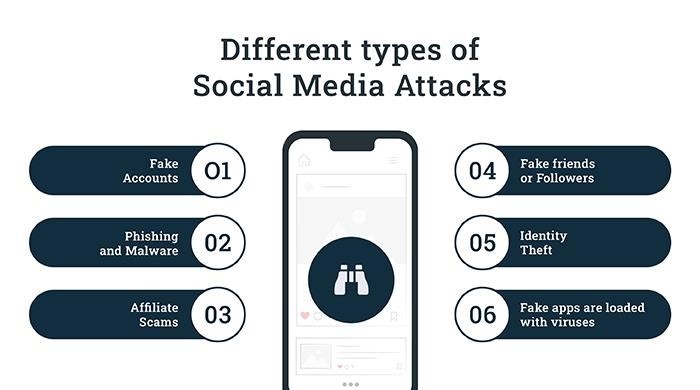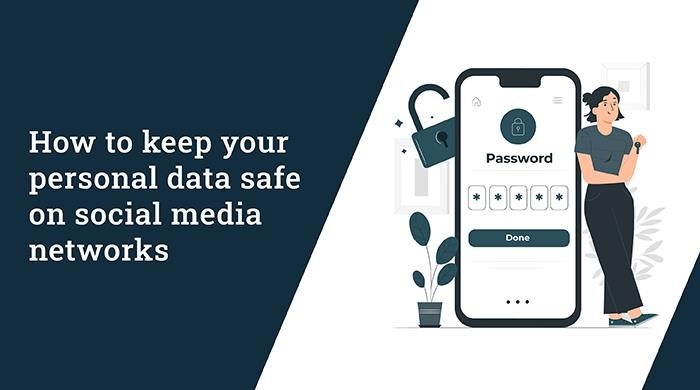Social media platforms have become one of the main parts of our lives and are a great way to stay connected with your friends, relatives, keep you updated with the current situations and news, to keep you entertained with videos, to rely on your judgment. Apart from the positive side of social media networks, you should be worried about the personal details you share on social media networks. Think twice before sharing your pictures or personal information to social networks because it will be there always. It’s very difficult to remove it from networks.
When you share a picture or details on the social media platform, other individuals may use your information to threaten you, damage your fame, or even harass you on social networks. Nowadays, Social media companies are also sharing their user’s pieces of information with other platforms without the users’ consent.
Keep in mind that sharing your current location and other personal details like your address and your day to day activities may lead to criminal activities like stalking, bullying, identity theft, and hacking. Once you share personal data on social networking sites, it is tremendously difficult to remove it from the internet.
Highlights of Contents
Different Types of Social Media Attacks

Listed some of the main social media attacks and the point of every scam is to make money. So be careful.
1. Fake Accounts (Pretending to be someone else)
Some people create fake accounts to impersonate a person, thereby making the person more likely to share personal information and click malicious links.
Cybercriminals also create lookalike fake accounts for famous brands, personalities, and corporate companies to get their user’s details.
2. Phishing and Malware
Phishing links are mainly used to collect the user’s personal information like login credentials. Once a user’s account is hacked, they will spread the malicious links to all the personal contacts to get their details. Attackers will also try to inject malicious links into comments or using popular hashtags.
3. Affiliate Scams
Affiliate Marketing is a trustful incentive program where companies pay incentives to the affiliate for the number of visits to their websites. But all the affiliate programs are not genuine, There are some scams In this program too.
Listed some of the scams in Affiliate Marketing:
- Receiving emails or messages saying that you will be getting money online or you have won a lottery like this.
- Receiving messages of membership programs that require an initial payment to join.
- Programs that use the similar name of brands for the promotion of their products.
- Online Training programs with a course fee.
4. Fake Friends or Followers
Friends and followers are great, but sometimes fake accounts add you only to send you a phishing message to get your personal information.
5. Identity Theft
Cybercriminals trawl social media for your pieces of information like date of birth, email address, home address, and relationship status. Attackers will be using this information for applying for credit cards, opening bank accounts, applying for loans, and finally, they will be using your name and other details for criminal activities. Every activity you perform online says something about you – so think twice before sharing your valuable personal information.
6. Fake apps are loaded with viruses
Check the app before installing it, It may contain phishing links. Before installing the applications, take the time to read the terms and conditions because real apps will also sell your data.
How to Keep Your Personal Data Safe on Social Networking Sites?
The following are some of the easy tips to stay safe online:
- Keep your personal info personal: Treat the “about me” fields as optional, it doesn’t mean you must fill them out. Be careful about how much personal data you share on social media sites like Instagram, Facebook, Linked In, and Twitter. When you share your personal information, there is more chance for cybercriminals to get your identity information or carry out other criminal activities like stalking and Bullying.
- Know and manage your friends on social media sites: Manage your personal social media profile to keep your real-life friends up to date with your life. A large number of friends on social networks doesn’t mean that they all are genuine friends, some people may even have criminal intentions.
- Be cautious about over-friending on social networking sites: We will be getting new friends through social media sites but we don’t know them personally. So keep a distance from them and don’t share your personal details with them. Some “friends or followers” can be very problematic by hacking your account or some friends may even have criminal intentions. Be careful when accepting friends, choose people who are real-life friends otherwise don’t share your personal information on that account.
- Don’t share your current or exact location on social media: Our current location is one of the most sensitive information. When you post photos on social networks with the geolocation tags, it may list the exact address of your location. With these details, your fake friends or followers may be able to find you at the location or this may even lead to physical theft. Before sharing photos, make sure that your location settings are turned off also don’t tag other people in your social media posts.
- Understand social media privacy and security settings: Try to learn the privacy and security settings of social networks like Facebook, Instagram, Twitter, and LinkedIn, try different options, and become a master of their use. Every social media site has an option to limit the audience for post-viewing and it can help you to control who sees your social media post.
- Know what action to take online: When someone is trying to harass you online, remove them from your friend’s list, don’t hesitate to block them and report them.
- Keep your security software current and updated: Make sure that you always update your security software, applications, and operating system. They often include software patches to cover the security holes. So keeping your software up to date is the best defense against cyber threats.
- If you are having doubt, Don’t click on links in email, tweets, and posts: If you click on the links, cybercriminals may steal your data so be careful. If something looks doubtful, throw it.
- Always log out when you’re done: Once you are done with the social media websites, logout from the device to ensure that no one will use your social media account for a cyber attack.
- Create strong passwords for your social media accounts: Try to use a password with a combination of numbers, special characters, words with upper and lowercase letters. Avoid common and easy passwords like name, address details, birth date, etc. Never save your password on a device, try to memorize your password.
- Delete the account and application from your device: Before installing the applications, we are giving them permission to access our details on the device hence all our activities on the devices are being tracked. When you stop using social networks, make sure that the account is deleted and the application is permanently removed from your device.
- Set up Two-Factor Authentication: Two-factor authentication is an extra layer of security for our personal information and it prevents someone from login into our social media networks even if they have our login credentials. It verifies accounts identity each time when you attempt to log in to your social media sites with a 6-digit code.
- Voice Biometric Authentication: To avoid identity theft and hacking, we can use Voice Biometric Authentication – which allows you to use your own voice (which nobody can have someone else’s) as a password instead of a weak manual password.
In speaker recognition, Voice Biometric Authentication identifies your voice to recognize you as a person. This reduces security risks.
Frequently Asked Questions
Q1. Are social media sites secure?
A1: No, Social Media Networks are not always safe. Nowadays, Social media companies are also sharing their user’s pieces of information with other platforms without the users’ consent.
Q2: How to protect your privacy on social media networks?
A2: Keep your personal info personal. Think twice before sharing your pictures or personal information to social networks because it will be there always. It’s very difficult to remove the information from social networking sites. Try to learn the privacy and security settings of social networks, try different options, and become a master of their use. Every social media site has an option to limit the audience for post-viewing and It can help you to control who sees your social media post.
Q3: What are the risks of using social media?
A3: Stalking, Bullying, Identity theft, and hacking.


Thanks for sharing such a great article on your website. It is very helpful.
I have read your article completely. Really, it’s very helpful. Keep sharing.